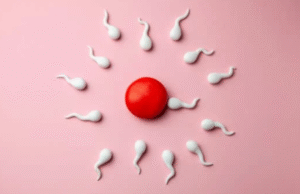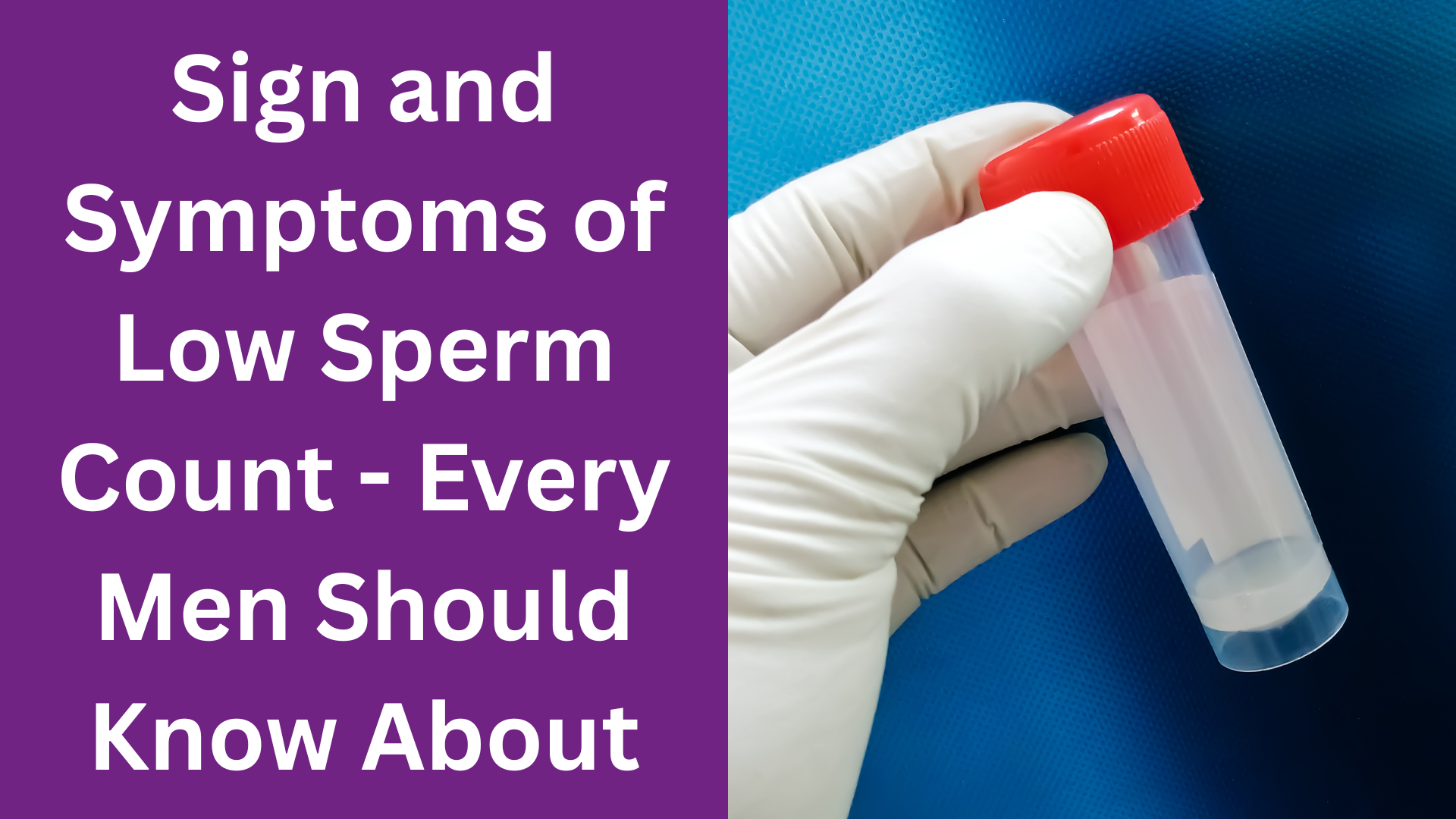Starting a family can be an exciting dream—but for some, it’s not as simple. For men, sperm health plays a big role in conception. Many don’t realize they have low sperm count until they start trying for a baby. If you’re wondering about the sign and symptoms of low sperm count, let’s break it down in a simple, non-scary way.
What is Low Sperm Count?


Low sperm count, or oligospermia, means fewer sperm than normal are found in a man’s semen. A normal sperm count is about 15 million sperm per milliliter of semen. Anything below that can make it harder—but not impossible—to father a child. Some men also experience sperm weakness symptoms, which affect how sperm move or function.
Causes of Oligospermia
Many things can affect sperm production or quality. Common causes include:
- Hormonal imbalances
- Varicoceles (enlarged veins in the scrotum)
- Infections like STIs
- Heat exposure (saunas, hot tubs, tight underwear)
- Smoking, alcohol, and drug use
- Obesity and poor diet
- Stress or mental health issues
- Certain medications
Knowing the cause can help shape the treatment, so diagnosis is key.
Sign and Symptoms of Low Sperm Count
Understanding the sign and symptoms of low sperm count can feel confusing at first. That’s because, unlike other health issues, low sperm count (also known as oligospermia) often doesn’t cause dramatic or visible changes in daily life. Many men feel perfectly fine—physically and sexually—yet still struggle with fertility. That’s why awareness is so important.
Let’s go over the most common symptoms and what they might mean. Keep in mind that just one symptom doesn’t automatically mean you have a fertility issue. But if you’re noticing a combination, or you’ve been trying to conceive for a while without success, it’s time to speak to a doctor.
Difficulty Conceiving Despite Regular Unprotected Sex
This is often the first and most obvious sign. If you and your partner have been trying to conceive for over a year without success, it could be due to low sperm count signs or other fertility concerns. Even if your sex life feels completely normal, the sperm itself may not be doing its job effectively.
Low Libido or Decreased Sex Drive


Low testosterone levels can affect both sperm production and your desire for sex. While low libido can result from stress or other factors, it’s also one of the oligospermia symptoms that shouldn’t be ignored—especially if it’s new or persistent.
Erectile Dysfunction (ED)
Struggling to maintain or achieve an erection isn’t always related to sperm count, but it can signal hormonal imbalances. Testosterone, the hormone responsible for sperm production, also affects your ability to get and maintain an erection. When hormone levels are off, sperm quality and count may be impacted too.
Pain, Swelling, or Lumps in the Testicular Area
If you notice swelling, tenderness, or lumps around the testicles, it might be a sign of an infection, varicocele, or other issues that impact sperm quality. These can reduce sperm production and lead to weakness in sperm movement—commonly referred to as sperm weakness symptoms.
Watery or Abnormal Semen Appearance
Healthy semen typically has a whitish-gray color and a thick consistency. If your semen appears watery, thin, or discolored, it could suggest a low sperm concentration. Though not a definitive sign, unusual semen texture is worth discussing with a specialist.
Reduced Facial or Body Hair
Low levels of male hormones (androgens like testosterone) can show up in subtle physical ways—such as less body hair, softening of voice, or muscle mass loss. These symptoms often go unnoticed but can be underlying signs of hormonal imbalances that affect sperm health.
No Noticeable Symptoms (But Still an Issue)
This might sound surprising, but many men with low sperm count have no noticeable symptoms. They feel completely healthy and discover the problem only during fertility testing. That’s why routine testing or a semen analysis is important when trying to conceive, even if you feel fine.
Bonus Insight: What About Symptoms of High Sperm Count?
Unlike low count, there are no specific symptoms of high sperm count. But men with healthy levels often show signs of high energy, stable moods, strong libido, and overall reproductive wellness. Still, quantity doesn’t always equal quality—healthy sperm also need to move well and have the right shape to fertilize an egg successfully.
When to Consult a Doctor?


You should see a specialist if:
- You and your partner have tried for over a year without success.
- You’ve had issues like undescended testicles, hormone disorders, or surgeries near the groin.
- You notice pain, swelling, or unusual changes in your sexual function.
- You suspect lifestyle or environmental exposures may have affected your fertility.
Don’t wait too long—early action makes a big difference!
How to Evaluate Low Sperm Count?
Here’s how fertility doctors typically assess sperm health:
| Test | What It Does |
| Semen Analysis | Measures sperm count, motility, and shape. |
| Hormone Testing | Checks levels like testosterone and FSH. |
| Scrotal Ultrasound | Looks for blockages or varicoceles. |
| Genetic Testing | Finds inherited issues that impact fertility. |
A single semen analysis may not be enough. You might need multiple tests to confirm the diagnosis.
How to Treat Oligospermia? – Prevention Methods
The good news? Most causes of low sperm count are treatable. Here’s how doctors and lifestyle choices can help:
🩺 Medical Treatments
- Hormonal therapy if there’s a hormonal imbalance
- Surgery to fix varicoceles or remove blockages
- Antibiotics for infections
- Assisted reproductive technology (ART) like ICSI or IVF if needed
🏃 Lifestyle Changes That Help


- Eat a balanced diet rich in zinc, antioxidants, and folic acid.
- Avoid smoking, excess alcohol, and recreational drugs.
- Exercise regularly but not excessively.
- Maintain a healthy weight.
- Keep your groin cool—skip tight pants and hot tubs.
These tips don’t just improve sperm count—they also boost energy, confidence, and overall well-being.
Conclusion
The sign and symptoms of low sperm count might not always be obvious, but they can impact your ability to conceive and your quality of life. The sooner you understand your body and seek help, the better your chances of addressing the issue. Remember—fertility is a team journey, and there’s always support out there.
FAQ – Sign and Symptoms of Low Sperm Count


What Are Signs of Unhealthy Sperm?
Unhealthy sperm may show poor motility, irregular shape, or low count. Signs can include trouble conceiving, abnormal semen texture, or hormonal symptoms like reduced facial hair or low libido. A lab test is the best way to assess sperm health. Visual appearance alone is not enough for an accurate diagnosis.
What Color is Healthy Sperm?
Healthy sperm, or semen, is usually a whitish-gray color. Slight variations can occur based on diet and hydration. Yellowish or greenish tones may signal infection, while pink or red could indicate blood. If you notice unusual colors consistently, it’s a good idea to consult a doctor for further evaluation.
What Drink Can Increase Sperm?
Drinks rich in antioxidants and vitamins—like pomegranate juice, fresh orange juice, or green smoothies with leafy greens—can help boost sperm health. Water also plays a key role in keeping the body hydrated, which benefits semen volume and quality. Avoid sugary sodas and excessive caffeine or alcohol for better results.
What is a Normal Sperm Count?
normal sperm count is considered to be 15 million sperm per milliliter of semen or more. Counts below this may reduce the chance of natural conception. However, sperm motility and morphology are also important. Even with lower counts, some men can still conceive with medical support or lifestyle changes.
How to Improve Sperm Count Fast?
To improve sperm count quickly, focus on a nutrient-rich diet, reduce alcohol and smoking, manage stress, and get regular exercise. Supplements like zinc, vitamin C, CoQ10, and folic acid may help. Sleep and hydration are also essential. In some cases, medical treatments or hormone therapy can accelerate improvement.




